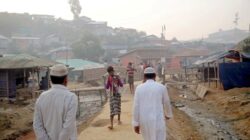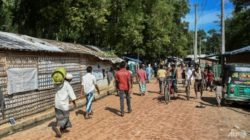By: Tito Dimas Atmawijaya (Observer on Human Right and a Lecturer at UNPAM)
Human Rights Watch asserts that the situation faced by the one million Rohingya refugees in Bangladesh remains dire, with limited prospects of a safe return to their homeland six years after the Myanmar military initiated mass atrocities in Rakhine State in 2017.
Despite this, the United Nations Security Council has failed to hold Myanmar’s military leaders accountable for their egregious crimes against humanity and genocide towards the Rohingya population.
In Bangladesh, over 730,000 Rohingya live in overcrowded camps facing increasing restrictions and violence by armed groups, while approximately 600,000 Rohingya in Myanmar are effectively detained by the junta under a discriminatory system.
Human Rights Watch emphasizes the plight of the Rohingya on both sides of the border, trapped without basic rights, justice, or the opportunity to return home. Unfortunately, the Security Council’s inaction and reduced governmental aid exacerbate the desperate situation faced by the Rohingya.
The persistent hopelessness among the Rohingya in both Bangladesh and Myanmar stems from escalating restrictions and deteriorating conditions. Since the military coup in Myanmar in February 2021, security forces have arrested thousands of Rohingya, imposed new movement constraints, and hindered humanitarian aid, including crucial medical assistance following the Cyclone Mocha.
Moreover, Rohingya refugees in Bangladesh encounter barriers to education, livelihoods, and movement similar to those experienced in Myanmar, exacerbating their vulnerability under domestic laws.
In the face of surging violence, criminal activities in camps, and a lack of protection by Bangladeshi authorities, Rohingya refugees encounter difficulties accessing police, legal aid, and medical support.
Restrictions on community-led schools, eviction of Rohingya shop owners, and drastic cuts in food rations have further aggravated their plight. The insufficient funding for the UN Joint Response Plan and reduced food rations have intensified malnutrition and desperation among the Rohingya community.
Humanitarian organizations and concerned nations, including the US, UK, EU, and Australia, must increase funding and pressure Bangladesh to alleviate restrictions hindering the Rohingya’s access to rebuilding their lives.
Additionally, there’s a pressing need to expand resettlement opportunities for Rohingya, particularly those targeted by armed groups, who face threats both in Myanmar and the camps.
The return of Rohingya to Myanmar under current conditions remains unsuitable and hazardous. Despite Bangladesh’s intentions to repatriate Rohingya, this approach has been marred by coercion and deception, emphasizing that conditions for safe, sustainable, and dignified returns do not yet exist.
The international community should prioritize establishing conditions for voluntary, secure, and respectful repatriation by coordinating a response that ensures civilian rule in Myanmar and seeks justice for past atrocities.
Concrete actions, such as instituting an arms embargo, referring the situation to the International Criminal Court, and imposing targeted sanctions on junta leaders and military companies, are crucial steps toward achieving this goal.





